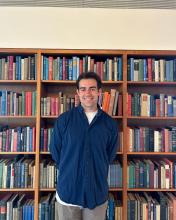Aidan Ruppert is a third-year UW student majoring in biochemistry and minoring in Russian. The Oleg Fomin Scholarship encourages exploration of the languages, cultures, and histories of post-Soviet states. Aidan, as the recipient of this scholarship, traveled to Georgia, Uzbekistan, and Kyrgyzstan.
As he began planning his trip, Aidan was most excited to see the natural beauty of Georgia’s geography; however, after he booked a tour to explore the mountains of Bishkek, Kyrgyzstan, on horseback, his interest in the surrounding regions grew.
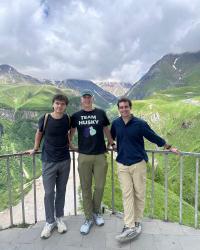
and Aidan Ruppert at the
Gudari View Deck in Georgia
“I think my expectation is that it's going to be pretty busy, but also very gratifying in that sense,” Aidan said, expressing excitement to practice his language skills in Russian-speaking countries. To experience the social cues of the language with people who have spoken it since birth will be a new and special experience.
From his travels to Tbilisi, Georgia, and Bishkek, Kyrgyzstan, to Tashkent and Samarkand in Uzbekistan, Aidan acknowledged how he will take away experiences and skills from his time abroad. For 18 days, Aidan and his two friends navigated the countries and their nuances.
Aidan reflected on a significant moment of his travels and dove into a tour he booked for Georgia. A guide picked his group up in a car and gave a tour of the mountains, allowing Aidan to see churches and monuments from the 1500s and 1700s along the way. Casual conversation with the guide eventually led the two to discuss the concept of déjà vu.
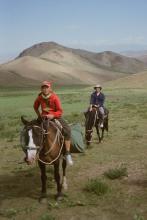
his 12-year-old guide, Ali
“I've never met him before, and he's thousands of miles away from my home. And so I think that moment where, you know, I realized no matter what our history or upbringing looks like, just kind of seeing that we all can share similar things even if it's weird, no conspiracies or thoughts on whatever, I thought it was a very endearing thing,” Aidan said.
His horseback tour in Kyrgyzstan held similar moments of wonder and surprise. The guides of this tour were two children, one roughly 12 and the other around the age of 17. Together, they navigated the tour group, with the eldest speaking fluent Kyrgyz and understanding minimal Russian, and the youngest speaking Russian and understanding minimal English. Aidan admitted that it was quite fun to be interacting with someone on the younger side in their native language.
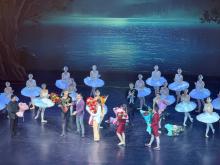
Aidan’s trip was full of positive moments of exploration, and despite the extreme heat and lack of readily available tap water resources, it was a trip full of adventure and gratitude. A spontaneous day was spent in Tashkent, Uzbekistan, and while he and his friends started the day with no plans, after walking around the city they found themselves going to a circus. Other days were filled with the ballet as well as exploring the bazaars.
“Every day was filled with really cool stuff, so my expectations were out of the water.”
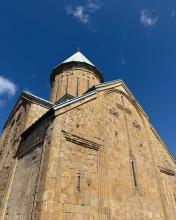
Aidan’s expectations were met and exceeded by the rich culture of the countries, and one prominent nature of this was the language. While he had visited countries where English was not the primary language, he had yet to visit a place where he could speak and understand this other language.
“That was just such a cool [thing], being able to go down the street and either look at the advertisements or the signs, you know, the windows, or go to the bazaars and order [and] try to get some tea, or candy or something like that, and be able to use Russian so easily was such a cool experience to have,” Aidan said.

During his recognition of the opportunities speaking another language opened, the gratitude towards his studies of Russian increased.
“I think it was during that moment when I realized, like, ‘Wow, because now I understand even a little bit of Russian, I now can communicate with millions [of] more people in the world,’” Aidan said.
Aidan’s advice to those traveling to post-Soviet states would be to keep an open mind and learn what you can from whomever.
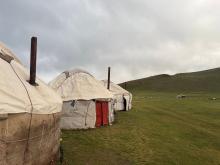
stayed in during their countryside
adventure in Kyrgyzstan
“Having wide eyes and an open heart to it all [...] really allows you to take in every aspect of every perspective. Because I think any post-Soviet state has a million and one perspectives on what [and] where their country is today, and what happened to it,” Aidan said.
Since returning home, Aidan has seen himself grow more confident in his Russian and more sociable to others in the Russian-language community. The formalities taught inside a classroom were greatly expanded upon during casual conversation abroad, and he has taken those moments and rooted them in his heart to go forward and make new connections.
